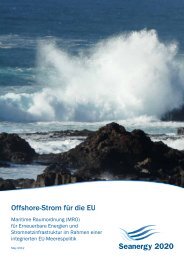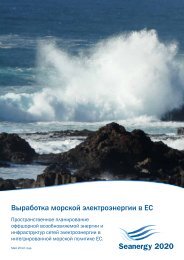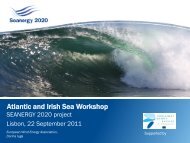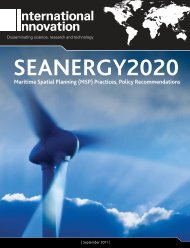Comparative analysis of Maritime Spatial Planning ... - Seanergy 2020
Comparative analysis of Maritime Spatial Planning ... - Seanergy 2020
Comparative analysis of Maritime Spatial Planning ... - Seanergy 2020
You also want an ePaper? Increase the reach of your titles
YUMPU automatically turns print PDFs into web optimized ePapers that Google loves.
4. NORTH SEA4.1 POLICY AND LEGISLATIVE FRAMEWORK4.1.1 Barriers and obstaclesThe absence <strong>of</strong> MSP or defined zones for ORE development may represent an obstacle to therealisation <strong>of</strong> ORE projects. This was the case in Belgium in 2002 where the first two <strong>of</strong>fshore windprojects were stranded either in the licensing process or further to appeals against an issued permit.These <strong>of</strong>fshore wind projects, situated in the territorial sea, have encountered different forms <strong>of</strong>opposition from a series <strong>of</strong> stakeholders/sectors such as the fishing sector, nature conservationsector, neighbouring countries (the Netherlands), coastal citizens, and the coastal provincialauthorities. Even if a legal framework for licensing and stakeholder consultation was in place at thattime, the fact that there was no MSP or ORE zoning policy constituted an obstacle to establishing<strong>of</strong>fshore energy.4.1.2 Good practicesAn MSP like exercise in Belgium, called „Master Plan North Sea‟, has resulted in the adoption byRoyal Decree (2004, as modified in 2011) <strong>of</strong> a preferential <strong>of</strong>fshore wind zone within the EEZ. Sincethe delimitation <strong>of</strong> this exclusive ORE zone, <strong>of</strong>fshore wind energy cannot be developed in theterritorial seas, but tidal and wave energy 47 can. The Belgian MSP like practice could be seen as analternative to the other three basic MSP models as outlined above 48 . A legally binding MSPinstrument for ORE zoning has been developed, not based on primary MSP legislation, but givingeffect to the Electricity Act <strong>of</strong> 1999 and its implementing Royal Decrees 49 .The designation <strong>of</strong> a preferential ORE zone outside the territorial sea was decided due to the juridicalaspects (appeals before the Council <strong>of</strong> State) <strong>of</strong> the first generation 50 <strong>of</strong> <strong>of</strong>fshore wind farmauthorisations in the territorial sea. This decision has provided since 2004 the necessary legalcertainty for <strong>of</strong>fshore wind farm investors, as it prevented to a large extent appeals against <strong>of</strong>fshorewind farms situated within the zone 51 . Another indicator <strong>of</strong> this measure effectiveness andattractiveness is that almost all 7 <strong>of</strong>fshore wind allotments have been assigned to date, except forthe last lot for which several project proposals were introduced in May 2011.47 Wave energy demonstration project FlanSea (2010) in Belgian territorial sea.48 Comparison <strong>of</strong> Best Practice across the EU in <strong>Maritime</strong> spatial planning, MRAG Ltd, 2011, p.10.49 Royal Decree <strong>of</strong> 2000,as modified by the RD <strong>of</strong> 2004, 2008 and 2011.50 In 2001, a series <strong>of</strong> investors introduced application files for the development <strong>of</strong> an <strong>of</strong>fshore wind farm inthe Belgian North Sea. C-Power received a domain concession but no environmental permit for its projectproposed on the Wenduine bank and <strong>Seanergy</strong> received a domain concession and an environmental permitin 2002 for its project on on Vlakte van de Raan. However, a series <strong>of</strong> appeals against the <strong>Seanergy</strong> projectbefore the State Council blocked for several years the execution <strong>of</strong> the permit.51 Although 1 granted concession (Seastar) has been withdrawn further to an appeal before the StateCouncil.Deliverable D 2.379 | P a g e






